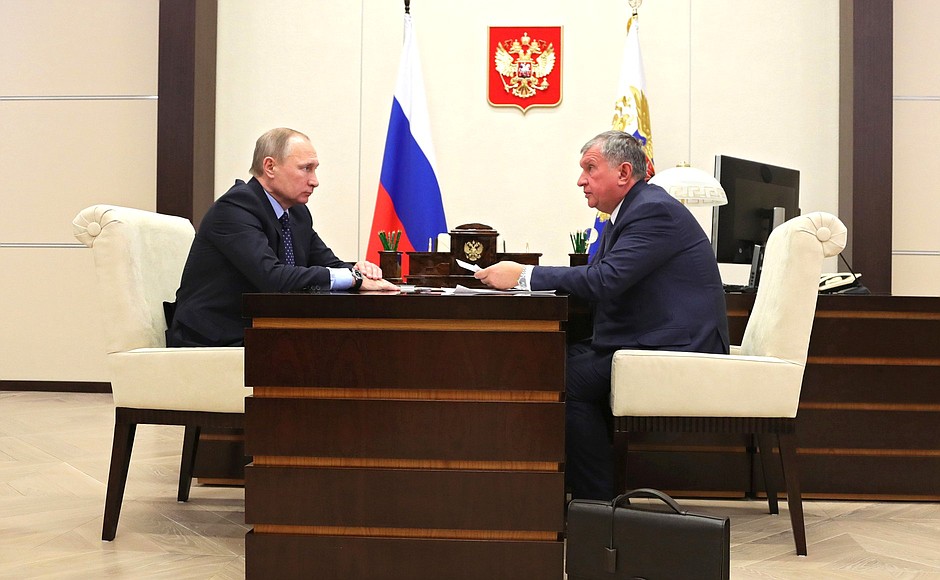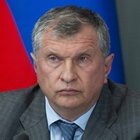
President of Russia Vladimir Putin: Mr Sechin, aside from the deal we all know about, how did the year go? What is the overall situation?
Board Chairman of Rosneft Igor Sechin: Mr President, 2016 saw particular volatility on the hydrocarbon markets. We had to work under pressure, but the year set a record in terms of production for Rosneft. Production increased by around 4 percent with total production for the year in liquid equivalent coming to 265 million tonnes. This is a record figure for the company. Of this amount, oil production accounted for 210 million tonnes, and we produced 67 billion cubic metres of gas.
Total investment in 2016 came to 750 billion rubles. Investment went mainly into increasing production drilling in Western Siberia and for new projects. This meant that the Suzunskoye field, the Vostochno-Messoyakhskoye field, which we developed together with Gazpromneft, and growth at Yuganskneftegaz became the main factors contributing to the production growth we achieved this year.
The volume of production drilling increased by 35 percent (to 9.3 million metres) in 2016, and we brought 2,700 new wells into operation. This was also a record figure, up 43 percent on the 2015 result. This was possible because the company created its own oil drilling service, and we increased the total number of well rigs by 20 percent in 2016. We discovered 13 new fields over the course of the year, and 103 new deposits with total reserves of up to 159 million tonnes in oil equivalent. We expect the reserves increment to reach 290 million tonnes. The Russian refineries affiliated to the company processed 87.5 million tonnes, and we processed more than 12 million tonnes at refineries abroad, also affiliated to Rosneft. Total processing thus came to around 100 million tonnes.
In 2017, we intend to bring processing at our facilities up to 120 million tonnes. The share of light petroleum products has grown to 56 percent, and the refinery yield has increased to 71.2 percent, compared to 2015. Primarily the company supplies our consumers in the Russian regions where we have a presence, and, of course, we ship to the export market.
Fuel oil production at Russian refineries decreased by more than 10 percent in 2016, in connection with new facilities coming into operation, and production of diesel fuel and Euro-5 petrol grew to 28.4 million tonnes, surpassing 2015 figures by 42 percent. As far as production was concerned, the year was tense, but positive for the company.
Regarding our tax and budget payments, taking into account the privatisation deal you mentioned, total budget payments came to more than 3 trillion rubles.
Vladimir Putin: Are you planning to meet with the investors?
Igor Sechin: Yes, Mr President. I wanted to ask you to meet with the investors taking part in the privatisation deal – our partners from the Italian bank Intesa, the Qatar Investment Fund, and Glencore – to underscore this deal’s significance and to brief you on the new projects in which they will take part. We plan to increase our active work with these partners. Right from the start, you helped to prepare this deal, followed it, and we would like to give our partners the chance to talk about the prospects ahead.
Vladimir Putin: Fine.
Igor Sechin: On international projects, the company continues working with its traditional partners and new ones. These include our Indian partners, ONGC, BP, with whom we are developing work, Exxon, Statoil, and Eni. Work is developing in all areas. We will increase supplies to China to 31 million tonnes this year, and at the same time, we have consolidated our refining capacity in Europe. We are now the third-biggest producer of petroleum products in Germany and we ship 18 million tonnes of oil to our own refineries there. We ship around 71 million tonnes to Europe as a whole, including the 10 million we supply to Belarus. As I said, we will deliver 31 million tonnes to China this year, and will start shipping to India. We will begin with 2 million tonnes this year and will increase this to 20 million tonnes, which corresponds to the refining capacity at the Essar refinery in Vadinar, which will now also become affiliated to Rosneft.
In 2017, we plan an investment programme of 1.1 trillion rubles. Particular focus will be on building up capacity at the new fields: developing the Suzunskoye, Lodochnoye, Russkoye, Kuyumbinskoye, Yurubcheno-Tokhomskoye and Taas-Yuryakh fields. Then there are our gas assets: Rospan, Kharampur, and the Kynsko-Chaselskoye field.
In 2018, we plan an investment programme of 1.3 trillion rubles.
Vladimir Putin: Good.
<…>
